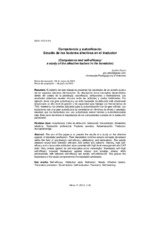Competencia y autoeficacia: Estudio de los factores afectivos en el traductor
Competence and self-efficacy: a study of the affective factors in the translator
Autor
Albin, Joanna
Editor
UCOPressFecha
2012Materia
AutoeficaciaEstilo de atribución
Motivación
Necesidades
Elementos afectivos
Traducción profesional
Factores sociales
Autoevaluación
Traductor
Autoaprendizaje
Self-efficacy
Attribution style
Motivation
Needs
Affective factors
Translation profession
Social factors
Self-evaluation
Translator
Self-learning
METS:
Mostrar el registro METSPREMIS:
Mostrar el registro PREMISMetadatos
Mostrar el registro completo del ítemResumen
El objetivo de este trabajo es presentar los resultados de un estudio acerca de los aspectos afectivos del traductor. Su descripción toma conceptos desarrollados dentro del campo de la psicología: autoeficacia, atribuciones y motivaciones. Los resultados obtenidos revelan vínculos entre las actitudes y ciertas habilidades. Por ejemplo, tener una gran autoeficacia y un estilo favorable de atribución está claramente relacionado un alto nivel de gestión y de capacidad para trabajar con herramientas de TAO. Asimismo, los criterios aplicados para la autoevaluación son de gran utilidad. Los traductores con una gran autoeficacia se consideran en términos de dinero y prestigio, mientras que los traductores con una autoeficacia menor tienden a autoreferenciarse más. Esto pone de relieve la importancia de los componentes sociales en la traducción profesional. The aim of this paper is to present the results of a study on the affective aspects of translator profession. Their description revolves around concepts developed within the field of psychology: self-efficacy, attributions and motivations. The results obtained reveal links between attitudes and certain skill patterns. Namely, high selfefficacy and a favourable attribution style correlate with high level management and CAT skills. Also, criteria applied for self-evaluation prove meaningful. Translators with high self-efficacy evaluate themselves against money and prestige criteria, while professionals with deficient self-efficacy are mostly self-referenced. This proves the importance of the social components in the translation profession

